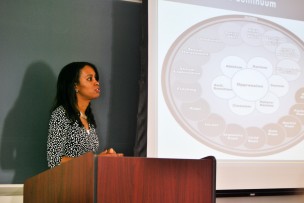
Wesleyan Parents Working Against Violence (WPWAV) sponsored a sexual assault discussion on Saturday, Oct. 20. Following a presentation by Therapist and Sexual Violence Resource Coordinator Alysha Warren and Sexual Assault Response Team (SART) Intern Rachel Verner ’15, parents participated in a question-and-answer session with representatives of the University administration, Public Safety (PSafe), and student groups that seek to promote awareness about sexual assault and sexual consent.
The presentation focused on defining, recognizing the common responses to, and determining the primary cause of sexual assault. According to the presentation, common responses to sexual assault include guilt, shock, fear, anger, isolation, nightmares, and mood swings, among others.
“The parents seemed very interested in the topic at hand and asked great questions,” Interim Assistant Director of Student Life Jonathan Connary wrote in an email to The Argus. “Some questions pertained to prevention efforts on campus, who are mandatory/confidential reporters, and the numbers of reported sexual assaults on Wesleyan’s campus. ”
Warren emphasized that the entire campus community is affected by sexual violence, not just the victims.
“We deal with it as a community,” she said. “It’s not just something that happens between two people. It’s something we all have a stake in.”
According to Warren, University faculty members are mandatory reporters, which means that an incident of sexual assault that is relayed to a faculty member must be reported to the proper authorities. Director of Public Safety David Meyer referenced the 1990 Clery Act as the reason for the mandatory reporting. The Clery Act, officially named The Jeanne Clery Disclosure of Campus Security Policy and Campus Crime Statistics Act, requires all colleges and universities that participate in federal financial aid programs to record and disclose information regarding crime on their campuses to the United States Department of Education. Any university that does not comply will face civil penalties.
“Before Clery, we never reported these issues,” Meyer said. “We’re private security; we didn’t have to [report the issues]. We didn’t have any avenues.”
Since Warren was hired by the University in the fall of 2011, she has implemented the Sexual Assault Survivors’ Support Group and Experiences of Healing, an eight-week support group for victims of sexual assault. In addition, next semester she will hold a workshop called Reclaimed Bodies: Mindful Healing Through Yoga.
As part of Domestic Violence Awareness Month, the Sexual Violence Action Committee (SVAC) in conjunction with the Counseling and Psychological Services (CAPS) has launched the Red Flag Campaign by placing small red flags around campus.
The campaign aims to educate the campus community about behavioral problems in relationships, such as excessive jealousy, emotional abuse, sexual assault, and more. In addition, there will be a mural painting in Usdan University Center from Oct. 22-26, an Open Mic on Oct. 29, and other events yet to be announced.
Peer Health Advocates Team Leader Ali Patrick ’13 introduced the WeSpeak, WeStand (Sexual Assault) one-hour bystander intervention training, which will be held on Nov. 1 at Alpha Delta Phi.
“I think in terms of prevention, I think that most of our focus is on building a community where sexual assault is not acceptable,” Patrick said. “It’s not just a perpetrator and a person who is sexually assaulted, it’s the whole community.”
One parent said she found the discussion to be valuable for all students.
“It was promising to hear that many of the RA’s and fraternities were asking for information and that there are upcoming workshops for interested students to be trained in ‘bystander intervention,’” Sarah Harari P’15 wrote in an email to The Argus. “It is my sincere hope that every Wesleyan student attends a workshop on this topic at least once and that those particularly interested in the topic look into the intervention trainings.”


Leave a Reply